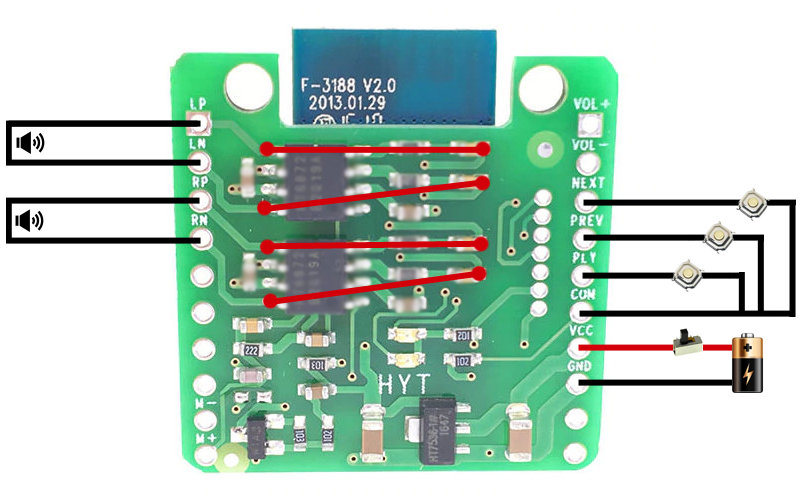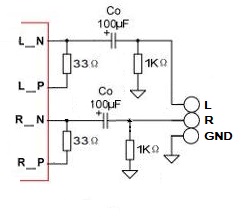Background
In the distant, not far off 2019, having once again damaged the wire from their wired headphones, it was already too lazy to repair / change it 100 and 1 times. And as usual in such cases, I went through the sites of stores in search of new ones.
That would be the end of the story, but it so happened that a good friend of mine suggested at that moment to move into the world of wireless audio. And it's not easy to get over, but in the DIY style, which still seemed interesting. Well, after a while, one long winter evening, the idea came up to draw up the results of all this in a more or less detailed post.
It is worth saying that I have been looking closely at wireless Bluetooth headphones for a long time, but all options with the purchase of ready-made ones were discarded due to the "fatal flaw" inherent in most of the available models - a monstrously short time of continuous operation without recharging.
The capacity of the battery used in wireless models, at best, allows them to work up to 1-2 days before all this wireless magic ends and asks for food. And since I have a habit sometimes just not to take off my headphones around the clock, such a duration of their work does not suit me at all. You could of course try to put batteries better for some ready-made model, I even admit that there are possibilities for this, but it probably would not be so interesting.
But first things first. As it is already clear from the name (for those who have come across this topic), the story will be about the Bluetooth audio module model CSR8645, manufactured by Qualcomm.
This chip is often used in wireless audio transmission. It does not belong to the "premium" class of models, but it is not budgetary either. In other words, there are chips that are better, there are even worse (obscenely worse). CSR8645 is regarded by the author as optimal for his experiments.
Requirements and expectations
In general, for all my many years of experience with headphones, there was already a set of some ideas about what I expect from them.
And when I finally decided to experiment with wireless ones (which did not happen right away, since it took some time to study the issue and think about certain aspects and problems), a more or less definite list of requirements for the result was formed:
sound quality is not worse than wired
lack of a noticeable delay in sound / lags (it can be important if you want to play games)
long operating time without recharging
acceptable weight
"",
1-2
Windows
, AptX ( , - ). AptX LL , , , .
Windows, Bluetooth-Stack ( – BlueSoleil, ). Linux , , .
, . , ( , , .)
()
CSR8645. : "" , 5- .
. , - , . , . (, ) . , .
, .
( -).


, , , .
, 26.2x13.5 . – 29x29 . .
Bluetooth-, Bluetooth 2.0 .
- , CSR8510 A10. - , ( ).
. , .
. , , Ergo VD-350. , , , . , .
, - 32 , ( ). , .
, , . , .. .
, , (3.3-4.2V) .
( ), ( 12V, ), -, 3.6 3.3V.
- (Li-Po) 3.7V.
. , Li-Po . , , .
" ". 18650, , , . - , ( ).
– , . , 18650 , " ".
. (- ) , , .
( - , , ).
On/Off ( / )
SMD ( mp3- )
( IDE-. )
18650 ()
18650 ( , - )
/ , .
, . "".
" – ".
, . , :

, 2 ( ), , SMD- ( ) (). - ().
, 5- . .
, , LP, LN, RP, RN CSR8645.
, ( , ), , :

( , ).
, , .
, - , . , , . , 4.2V.
( 3 5 ):

, .
LP, LN – . RP, RN .
COM . , ( ).
, , ( PLY, Play/Pause ), , . ( ).
, , , ( ) .



:
-
Previous Track
Play/Pause
Next Track
, . , - , .
, . , . , .
, . , , 2 SMD- . - , .
. , .
:
( ): 220
: 50-80
24/24, : ~4-5
16/24: 10
(2000 2200 mAh), . 2 , , .
Bluetooth- , .
:
WIFI- ( - , + ).
FM ( - - , - ).
, 2.4- ( , Wifi Bluetooth). , , - ( )
Bluetooth 2.0 ( 10 ) . 1-2 .
, , .
, .
, 10-15% .
, +10-15% . , .
- 2.4- ( Wifi-), .
, , . , , . Bluetooth-, ( - ). , , , .
, - , / BT-.
/
. - , "" , , .
, , ( , ), .
.
, . .
(, jack ), , , , .
( ). , - .
. , - .

CSR8645 AliExpress (, , )
tl;dr
This seems to be all. I hope the article will be interesting, at least for non-professional amateurs from time to time to play with electronics (to which the author himself refers).